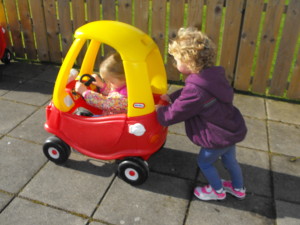You’ve just got the housework done, the daily load of washing on, the baby down for her nap, and you’ve finally managed to get your face washed; and all before midday, yippee!! You’re contemplating a nice cuppa and a well-earned rest when you realise the time, give a groan and think do I reaaaaaaaalllllly have to take my toddlerto Mums and Tots?? Here’s why it’s important……
Eight reasons Why is socialising important for children from baby stage?
- Helps to develop children’s confidence around other people – makes them less anxious about being away from their prime caregiver. Even if you are worried about something negative happening, for example, pushing or biting, these incidents are all part of developing life experiences.
- Social skills can be learned and developed – the more opportunities your child has to develop that skill, the more comfortable and confident they will become in forming relationships with others.
- Prepare children for when they start at nursery/school – Socialisation helps children to become less anxious about being separated from their parents. If your child is used to being at home with you for the majority of the first few years of their life you may meet some resistance to leaving them for a school day!
- Helps develop positive friendship bonds and emotional connections later in life – Child psychologists say that from birth children need to feel a sense of belonging and safety and this initial security will then help them to feel comfortable when forming positive friendship bonds later in life. If you are happy to befriend these other people your baby or toddler will be too.
- Helps him to learn to share and take turns – socialising with other children will teach him how to share adults attention; the play space; and toys. It will also allow him to learn how to take turns with different toys and play equipment.
- Encourages child to think of others – they learn that other people have feelings, needs, and desires just like they do. This means that if a child does not like the way someone is treating them, they can realize that that means that if they treat others that way, the other person is likely to get upset and feel hurt.
- They can watch you and their carers modelling good social skills – they can see from the way you or their carers interact with others what is appropriate social behaviour.
- Children learn acceptance of others – when children socialise with other children with varying abilities and disabilities they learn to accept everyone in exactly the same way. They learn to find ways of adapting play sothat everyone can join in; and helping others to enable participation becomes a natural part of life


